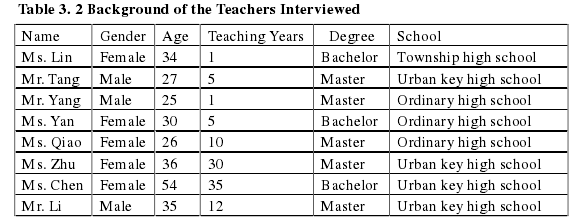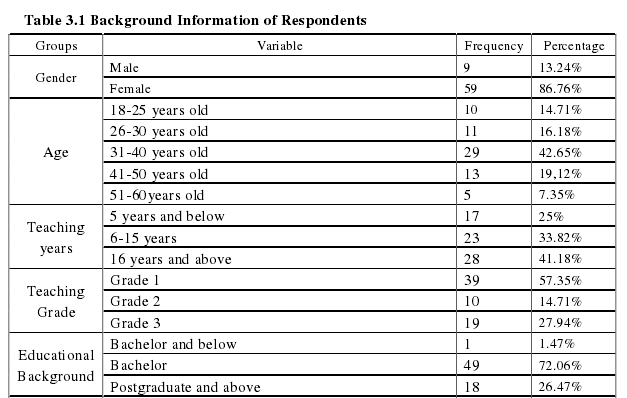本文是一篇英语毕业论文,本研究调查了广东省高中教师语法教学信念的总体情况,找出了存在的问题,然后分析了存在问题的特定群体。研究对象为68名来自广东省不同高中的英语教师。本研究通过问卷调查收集定量数据,通过访谈收集定性数据。问卷由十个维度组成:教师对语法认知的信念、教师和学生的角色、注重形式、交际意义、归纳教学、演绎教学、句型练习、语法术语、学习策略和语法教学评估。
Chapter 1 Introduction
1.1 Background of the Research
English is a subject that plays a highly significant role in basic education. It is impossible for Chinese students to have a learning environment like that of native English learners. It is impossible for Chinese students to get enough English language stimulation and internalize their language rules in English class or at ordinary times. They are not able to naturally acquire English by simple imitation. Therefore, the necessary and effective learning of basic English grammar rules can help Chinese English learners reduce and prevent errors in language practice, and help them to develop their ability to understand and use English correctly. It can make them detours less in the process of learning English and help them master English better within a shorter time, which can be called a shortcut to learning.
The purpose of grammar teaching in senior high school is to assist students in mastering basic sentence patterns via learning basic grammar rules, and to carry out practical activities such as listening, speaking, reading and writing with sentence patterns. At the same time, the New Curriculum Standard also plainly indicates: “the focal point of this curriculum reform is to alter the tendency that English curriculum overemphasizes the explanation of grammar and vocabulary knowledge, but overlooks the cultivation of students‟ practical language proficiency...” However, because of some teachers‟ wanting understanding of the concept of the new curriculum reform, there are mainly two extreme phenomena in grammar teaching in senior high school: one is the weakening of grammar teaching represented by young teachers. They mistakenly believe that grammar teaching is unimportant, which causes foreign language teaching to shift from “emphasizing knowledge and neglecting ability” to “emphasizing ability and neglecting knowledge”. Another phenomenon is the emphasis on grammar knowledge, which is represented by elderly teachers. It is hard for them to give up their accumulated grammar teaching experience for a long time. They overstress the significance of grammar rules and implement “cramming” teaching with grammar as the key link. Obviously, these two phenomena run counter to the concept of the New Curriculum Reform. “Altering the tendency of overstressing the explanation and teaching of grammar” only requires changing the previous teaching method of grammar, not requiring giving up grammar teaching; and the practice of emphasizing grammar teaching is time-consuming and inefficient, which makes people feel numb.
1.2 Purpose of the Research
As far as the research on English teachers‟ teaching beliefs has been concerned, some achievements have been accumulated. However, the present researches on the relationship between English teachers‟ teaching beliefs and teaching mainly focus on college education, while the research focusing on the stage of basic education is not rich. English is a very important subject in senior high school education. Grammar teaching is a shortcut for high school students to learn English well. At present, there are many researches on grammar teaching in senior high school, but the research on English teachers‟ beliefs in grammar teaching is very rare. Pajares (1992) believed that teachers‟ beliefs influence their teaching behavior more than their knowledge. Zhao Changmu (2004) also believed that what kind of educational belief a teacher has as a leader and manager of teaching activities will have a great impact on what kind of teaching and management he adopts.
Therefore, this thesis takes senior high school grammar teaching as the breakthrough point, and further explores senior high school English teachers‟ grammar teaching beliefs by means of questionnaire survey and interview, so as to find out the problems existing among senior high school teachers in terms of their grammar teaching beliefs and then work out the relevant solutions.
Chapter 2 Literature Review
2.1 Definitions
A detailed description is illustrated in this part, including the definition of belief, teacher‟ belief, and teachers‟ beliefs in grammar teaching. They are elaborated as follows.
2.1.1 Definitions of Belief
The exploration of belief can be traced back to the works of Plato, the ancient Greek philosopher. He believed that people‟s belief is the narration of something that is below the level of knowledge. It does not belong to the classifications of knowledge. And the connection between belief and knowledge is “Knowledge is belief tested by time” (comfort, 1935; quoted from Liu Hua, 2004). According to modern psychology, belief is defined as the individual‟s permanent and unchangeable view of a certain theory or idea about nature and society. It can be said that belief is the spiritual mentor for people to interpret and change the world, and the incentive force for all activities. Once a certain belief is established, it will affect people‟s psychology and behavior, which determines the speed, direction, and effect of individual development and growth; at the same time, once a certain belief is shaken or disintegrated, it is the beginning of people‟s mental collapse and behavior degradation (Yu Guoliang, Xin Ziqiang, 2000). In short, belief is the accumulation of personal knowledge of the real world, which contains cognitive feelings and skills, and can guide individual thinking and action.

2.2 Theoretical Foundation
Teacher Cognition and Focus on Form play a significant role in teachers‟ belief. They are the theoretical foundations of this research and are elaborated as follows.
2.2.1 Teacher Cognition
In recent years, scholars at home and abroad have made new progress in the research of teachers‟ teaching beliefs both in theory and in practice. At the same time, the discussion of English teachers‟ beliefs in grammar teaching is in the ascendant.
Cognition is an elemental part of psychology. It is a person‟s capability and behavior to pay attention to things and obtain information rationally. Broadly speaking, it is the core of thinking activities. As cognition is formed based on memory and perception, it has an effect on perception and memory. So what is cognition? There are different explanations for this. According to Gui Shichun (1991), cognition is a psychological process as well as a process of acquiring and applying knowledge. In addition, cognition is defined as the application of human intelligence, such as a variety of activities. Borg (2006) pointed out, teacher cognition refered to the cognitive processes and structures which influence, and are influenced by, what teachers do.
As time goes by, the appearance of cognitive psychology has greatly changed the perspective and direction of educational research, stressing the influence of thinking on behavior (Mohammad Reza Gerammi & Nooreen BT Noordin, 2013). Previous studies on teachers‟ cognition showed that teachers are a complex cognitive system, which largely determines the scope of teachers‟ classroom practice. As a result, teaching was considered as a rather complex cognitive activity in foreign language education, and teachers were considered as “active thinking decision makers” making use of practice-oriented, complex, context-related and personalized knowledge networks, ideas and beliefs (Borg, 2003).

Chapter 3 Research Design ........................................ 23
3.1 Research Questions ...................................................... .23
3.2 Research Instruments ................................................... 23
Chapter 4 Results and Discussion ............................................... 31
4.1 Results from Overall Questionnaire Analysis .............................. 31
4.1.1 Teachers‟ Grammatical Cognitive Beliefs .............................. 32
4.1.2 Teachers‟ Beliefs about Teachers and Learners‟ Roles ......................... 34
Chapter 5 Major Findings and Implications ..................................... 54
5.1 Major Findings .......................................... 54
5.2 Implications for English Grammar Teaching ................................... 56
Chapter 5 Major Findings and Implications
5.1 Major Findings
This research mainly uses the questionnaire and interview method to collect the related data of grammar teaching beliefs of senior high school English teachers with the purpose of analyzing the existing problems and the reasons of grammar teaching belief of senior high English teachers in Guangdong Province. The following are the summary of the main findings of this research.
(1) Through questionnaires and interviews, the author finds that generally the beliefs of senior high school English teachers in grammar teaching are positive.
Generally, Teachers‟ overall beliefs in grammar teaching reflect the concept of the new curriculum reform. Most of the teachers hold that it is very essential to master grammar knowledge to upgrade English level; grammar capability is an integral part of language proficiency; grammar teaching should not only attach importance to the explanation and teaching of grammar and vocabulary knowledge, but also pay attention to the cultivation of students‟ practical language ability. Meanwhile, most teachers have come to realize that the main body of learning should be students. English classroom is a place where learners participate in research and solve problems. Teachers are supposed to be guides and enlighteners rather than knowledge inculcators. They also realize that they should guide students to construct their own understanding of grammar. Grammar teaching should meet the students‟ interests, needs and cognitive abilities; grammar learning should be the combination of listening, speaking, reading and writing; in addition, grammar teaching should pay particular attention to social and situational features. They have also realized that the purpose of evaluation is to check teaching gains and losses, instead of recording students‟ achievements. At the same time, evaluation methods should be diversified, not just paper and pencil tests.
Chapter 6 Conclusion
6.1 Summary of the Research
Firstly, this research investigates the overall situation of teachers‟ beliefs of grammar teaching in senior high schools in Guangdong Province, finds out the problems, and then analyzes particular groups with the problems. The subjects are 68 English teachers from different high schools in Guangdong Province. Quantitative data is collected in this research through questionnaire survey and qualitative data is collected through interview. The questionnaire consists of ten dimensions: Teachers‟ beliefs in grammar cognition, teachers‟ and students‟ roles, form focused, communicative meaning, inductive teaching, deductive teaching, sentence pattern practice, grammar terms, learning strategies and evaluation of grammar teaching.
Secondly, by analyzing the questionnaire data, the research finds that here are some differences in grammar teaching beliefs of senior high school English teachers in Guangdong Province, especially inductive teaching and deductive teaching, as well as two teaching methods focusing on form or meaning.
Thirdly, through group analysis, the research finds out the particular groups that have the problems in terms of their grammar teaching beliefs. Then the author reviews some of the members in the groups, so as to discover the reasons.
Finally, according to the research results, some teaching implications are put forward to improve teachers‟ grammar teaching belief.
reference(omitted)
